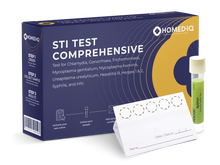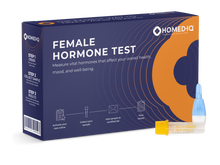Lauren is a health scientist and science communicator currently living in the Netherlands. Originally from Canada, she completed a Research Master’s in Health Sciences at the Netherlands Institute of Health Sciences at Erasmus University Rotterdam (NIHES) with a specialisation in epidemiology. Prior to her master’s degree, she completed a Bachelor’s degree in Health Sciences at Simon Fraser University. With a background in public health, her goal is to create accurate scientific content that is easy to understand and empowers people to make informed decisions. Within Homed-IQ, Lauren works as a Product Developer and Content Lead, working closely with physicians and scientists on medical devices for Homed-IQ’s new products and written communications.
HIV: symptoms, tests and treatment
Human immunodeficiency virus (HIV) is a virus that attacks your immune system, making you more vulnerable to invading viruses and bacteria. HIV attacks immune cells in your blood known as CD4 cells. CD4 cells help protect you against infections and illness. If your immune system is highly weakened and your CD4 cells drop to a low level, HIV can progress to acquired immunodeficiency syndrome (AIDS).
Table of Contents
- Is HIV the same as AIDS?
- How do you get HIV?
- How contagious is HIV?
- How long is HIV’s window period?
- What are the consequences of HIV?
- Can HIV be cured?
- How do you treat HIV?
- How can you prevent HIV?
- How can you test for HIV?
Is HIV the same as AIDS?
HIV is not the same as AIDS- many people have HIV but will never have AIDS. AIDS is a disease that can arise from an HIV infection, and occurs when opportunistic infections, tumors, or other diseases occur due to immune system suppression. AIDS is generally defined as when CD4 count drops below 200 cells/uL (Radboudumc).
How do you get HIV?
You can become infected with HIV if you come into direct contact with body fluids (blood, semen, breast milk, rectal fluids, or vaginal fluids) of someone with an HIV infection and detectable amounts of HIV virus in their body. Direct contact means that the fluids have to enter your body in some way, such as through a cut. This means that you can contract the virus through unprotected sex, using a contaminated needle, or through a blood transfusion with contaminated blood. When a mother has an HIV infection, she can also transmit the virus to her child during pregnancy, childbirth, or through breast milk. HIV is not transmitted through fluids such as saliva, sweat, urine or tears, and cannot be spread through kissing, sneezing, hugging, coughing, shaking hands, or sharing eating utensils.
How contagious is HIV?
There is generally no risk of HIV infection in everyday life. However, if you come into contact with certain body fluids of an infected person, there is a chance of infection. HIV is mainly transmitted through unprotected sex (RIVM, 2021). Anal sex carries a greater risk than vaginal sex. This is because the vagina produces natural lubrication that reduces the chance of friction or cuts to occur that could allow the infection to enter the body. Conversely, the rectum has a thinner lining and no natural lubrication, meaning the risk of infection is higher. The chance of infection through contact with contaminated blood is estimated to be more than 95 percent.
How long can HIV survive outside the body?
When HIV comes into contact with the outside air, the virus dies very quickly. As a result, HIV can only survive outside the body for a few minutes. Therefore, it is not dangerous if you come into contact with infected blood after a few minutes.
How long is HIV’s window period?
Homed-IQ’s HIV test is a fourth-generation test that also checks the p24 antigen. It takes approximately four weeks from the moment of infection for HIV to be detectable by a test. In very rare cases, it can take up to twelve weeks for an HIV infection to be detected by a fourth-generation test. If you perform a test for HIV after four weeks and receive a negative test result, it is recommended to test again after twelve weeks to completely rule out an infection (NHG).
What are the symptoms of HIV?
An HIV infection consists of three stages, each with different symptoms:
Acute HIV Infection: this is the earliest stage of an HIV infection and has an incubation period of 2 to 4 weeks after being infected. During an acute HIV infection, HIV multiplies rapidly and is present in the blood at very high levels. Some people develop flu-like symptoms during an acute HIV infection, with symptoms such as:
- Fever
- Swollen lymph nodes
- Sore throat
- Fatigue
- Headache
- Skin rash
- Lack of appetite
- Nausea
- Diarrhoea
- Joint pain
These symptoms are not noticeable in everyone, and some people have no symptoms at all. After a few weeks, the symptoms disappear.
Chronic HIV Infection: during this stage of infection, HIV continues to multiply in the body at low levels. Individuals with a chronic HIV infection may not have any symptoms, and can remain in this stage of infection untreated for ten years or longer. People who take antiretroviral therapy (ART) for HIV can remain in this stage for life. If ART is taken correctly, the amount of HIV in the blood can fall to undetectable levels. This means an individual with HIV has virtually no risk of transmitting the virus to others, even during unprotected sex.
AIDS: in the final stage of an HIV infection, HIV has damaged the immune system severely. There is a high amount of HIV in their blood and a low number of CD4 (immune) cells. This makes people with AIDS more likely to get illnesses that individuals with healthy immune systems would not get. These infections are known as opportunistic infections or cancers. While AIDS is a life-threatening condition, many people with HIV never reach this stage due to the availability of ART. It typically takes 8-10 years for untreated chronic HIV to progress to AIDS. Symptoms that may occur due to the opportunistic infections and cancers during AIDS include:
- Sweats
- Chills
- Fever
- Skin rashes or bumps
- Weight loss
- Chronic diarrhoea
- White spots or lesions on the tongue or in the mouth
- Swollen lymph nodes
- Fatigue
What are the consequences of HIV?
The consequences of HIV can be serious. Living with undiagnosed or untreated HIV can have serious health consequences and can also cause other people to become infected. This is because untreated HIV levels rise in the blood over time, meaning an individual is more infectious and the immune system is increasingly weakened. Without treatment, HIV can progress to AIDS and life threatening opportunistic infections can occur.
Can you lead a normal life with HIV?
Yes, if you are on treatment and are otherwise healthy, people with HIV can live full, healthy lives. Through advances in antiretroviral therapy, the life expectancy of people with HIV is increasingly approaching that of people without HIV. With consistent and effective treatment, it is possible for the levels of HIV in the blood to be so low that it is impossible to transmit the virus. This means that people who are on treatment and virally suppressed can have unprotected sex without infecting their partners and enjoy normal, happy relationships.
Can you grow old with HIV?
Yes, people with HIV now have a life expectancy that is almost the same as those without HIV. However, people with HIV are more likely to develop certain chronic diseases, which are associated with aging and/or long term use of antiretroviral medication. HIV patients are also more likely to suffer from other age-related complaints, such as a decreased libido, fatigue, and lower energy.
How many people have HIV?
In the Netherlands, 24,000 people live with HIV. Worldwide, 37.7 million people live with HIV (Aidsfonds).
Can HIV be cured?
Unfortunately, HIV cannot be cured. However, through treatment with antiretroviral therapy you can ensure that you do not get sick and that you cannot infect others.
How do you treat HIV?
HIV is treated with antiretroviral therapy (ART), which stops the virus from replicating in the body. This allows the immune system to repair itself and return to normal. A combination of HIV drugs is used during ART because HIV can quickly adapt and become resistant to drugs. HIV positive individuals need to remain on ART for life, as stopping or pausing ART can cause a recurrence of illness and drug resistance.
How can you prevent HIV?
You can prevent HIV in the following ways:
- Have safe sex by using condoms or other barrier devices correctly, every time
- Never share or reuse needles
- Get tested regularly for HIV and other sexually transmitted diseases.
- Test for HIV during pregnancy.
- Use PrEP before engaging in potentially risky sex or drug use. PreP is a pill that prevents you from contracting HIV, if taken before being exposed.
- Immediately seek medical attention if you believe you have been exposed to HIV. Post-exposure prophylaxis (PEP) can be used to prevent an HIV infection from occurring.
How can you test for HIV?
Testing for HIV usually involves a blood test. You can do this through a doctor, public health clinic, or through a home test. For example, with Homed-IQ’s STI Test Complete. In addition to HIV, this home test also tests for chlamydia, gonorrhea, syphilis, and trichomoniasis.
When should you test for HIV?
An HIV test is recommended if you have had unprotected sex with someone you suspect has HIV. It is also advised to do an HIV test if you have symptoms related to HIV. Please be aware of the incubation time of HIV- it can take up to three months following exposure for HIV to appear on a blood test.
How does an HIV blood test work?
During an HIV test, a small amount of blood is taken and analyzed. With Homed-IQ’s home HIV Test, this is done by means of a finger prick that is deposited into a small collection container. Your blood sample will then be examined by a certified laboratory. You will receive your results within a few days. Results are always provided with a clear explanation of what they mean.
How reliable is an HIV self-test?
All blood tests sold by Homed-IQ are just as effective as the tests you would do at your doctor, medical clinic, lab or hospital. This means they have been scientifically validated to perform as well as an in-person test.
What are the benefits of a home HIV test?
The biggest advantage of Homed-IQ’s HIV test is that you can take it at home. This means you do not have to visit a doctor’s office and you can do the test completely anonymously. Just like at the doctor’s, you will also receive the results within a few days without needing any additional appointments.
Is this HIV test reimbursed by my health insurance?
We currently do not have any agreements with health insurers. Therefore, at Homed-IQ we strive to keep our tests as affordable as possible to give everyone the opportunity to get a better understanding of their health.









